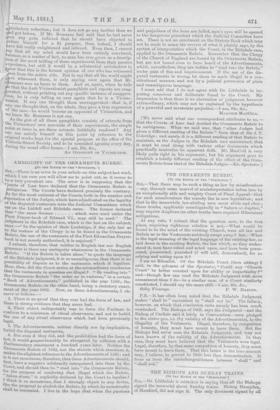THE ORNAMENTS RUBRIC.
[TO TTIE EDITOR OF " SPECTATOR."]
SIR,—That there may be such a thing as law by misadventure —say, through some marvel of misinterpretation fallen into by an exceptionally able and weighty Court of Final Appeal—that for such misadventure the remedy lies in now legislation; and that in the meanwhile law-abiding men must abide and obey ; these truths, applicable unmitigatedly in " Saturn or Jupiter," may require Anglican (as other truths have required Hibernian) mitigations.
At any rate, I submit that the question now, in the first place, requiring righteous solution is not,—What would be found to be the mind of the existing Church, were1 a__ 11 law and Rubric as to the Vestments suddenly swept away ? but,—What is the legal meaning of the legal language of the existing law, as laid down in the existing Rubric, the law which, as they under- stood it, men have relied and acted upon, and have been perse- cuted, prosecuted, punished (I will add, demoralised), for so relying and acting upon it P I am no Ritualist. Of the Ridsdale Court (then sitting) I said, in the columns of the Spectator, " Could any Church Court' be bettor counted upon for ability or impartiality P" and—though few can read the Ridsdale judgment with more amazement than I do—in a similar case, of a Court similarly constituted, I should say the same still.-1 am, Sir, &c.,
P.S.—It has often been noted that the Ridsdale Judgment makes "shall be" equivalent to "shall not be." The fallacy, however, on which that conclusion rests mainly has been much. overlooked. The Bishops of 1662, says the Judgment—and the Bishop of Carlisle said it lately in Convocation—wore pledged to the status quo, i.o. (by validity of the Advertisements), to the illegality of the Vestments. Illegal, therefore, by compulsion of honesty, they must have meant to leave them. But the Bishops had never seen the Ridsdale Judgment, and may not have known of the validity of the Advertisements. In that case, they must have believed that the Vestments were legal. Legal, therefore, by that same compulsion of honesty, they must have meant to leave them. That this latter is the true account may, I believe, be proved. to little less than demonstration. It frees us from the interchaugeablenees between " shall " and " shall not."


































 Previous page
Previous page